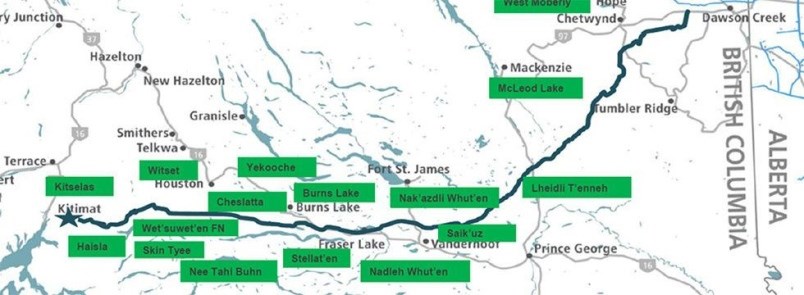The B.C. Prosecution Service has decided against pursuing criminal contempt charges against the 14 people arrested in January at a blockade against the Coastal GasLink pipeline project.
In a statement read out Monday during a hearing before B.C. Supreme Court Justice Marguerite Church, BCPS Crown counsel Trevor Shaw said that after a review of the evidence, the BCPS is "not satisfied that there is the necessary evidentiary basis for a substantial likelihood of conviction."
At issue was whether those who occupied the blockade, located near the Morice River Bridge south of Houston, had knowledge of an injunction against their action when RCMP made the arrests.
A requirement that a notice of the injunction be posted at the Morice River Bridge was waived on January 4 and three days later, RCMP moved in to break up a blockade at a spot further north on the Morice River Forest Service Road.
"The events on January 7, 2019 were dynamic and did not include various steps or actions related to notice that might have arisen in a different context," Shaw said. "This is simply the nature of what happened that day."
Following on Shaw's statement, CGL lawyer Kerry Kaukinen said the company will not pursue civil contempt proceedings against the 14, noting the standard of proof is the same as in a criminal proceeding.
In accepting the submissions, Church said that all those arrested are now aware of the injunction and should they breach the order in the future, "the position of this court might be quite different."
About 25 people attended the hearing, many wearing T-shirts and hoodies with "Wet'suwet'en Strong," #notrespass" and a picture of a grizzly in native motif, representing one of the houses within the first nation's traditional governance structure, emblazoned on the front.
Celebratory drumming was performed outside the courthouse following the outcome.
Molly Wickham, one of the 14 arrested, called it a victory.
"I felt like there was a little bit of justice today in this whole struggle," said Wickham. "I felt a huge injustice when we were arrested and taken off the territory. I felt that because we were doing the right thing, we were following our own laws, we weren't doing anything that should have resulted in us being arrested."
In a statement, Coastal GasLink President David Pfeiffer said the company remains committed to "respectful and meaningful dialogue, focused on listening to all concerns and resolving issues as best we can in a peaceful and constructive manner."
If built, the 670-kilometre $6.2-billion pipeline would deliver natural gas to the $40-billion LNG Canada project near Kitimat from a station at Groundbirch west of Dawson Creek.
The company has reached a series of benefit agreements with 20 elected bands along the project route including those of the Wet'suwet'en, amounting to hundreds of millions of dollars.
However, the Wet'suwet'en hereditary clan chiefs are stonglky opposed, saying they did not give permission for it to be built. They also say the elected bands' authority ends at the borders of their respective reserves while they have authority over the Wet'suwet'en's entire traditional territory.
Still at issue is whether to make the injunction permanent. As it stands, the injunction is to last until May 31 to give CGL time to complete pre-construction work in the area in dispute.
As well, a challenge is now being heard by the National Energy Board over the jurisdiction of the B.C. provincial regulator of the pipeline.
Smithers resident Mike Sawyer argues that because TransCanada Corp., which owns CGL, will operate the pipeline and the connected Nova Gas Transmission Ltd. system together, they form a single pipeline that crosses the Alberta-B.C. boundary and therefore must be regulated by the federal government.
TransCanada's response is that the purpose of Coastal GasLink is to move natural gas entirely within the province and therefore provincial approvals are appropriate.
- with files from Citizen news service



